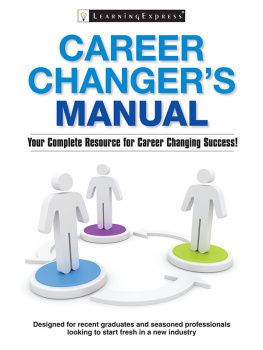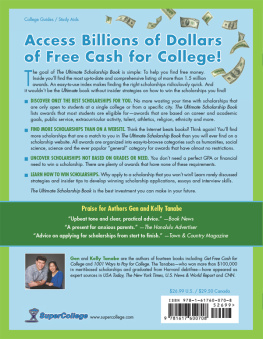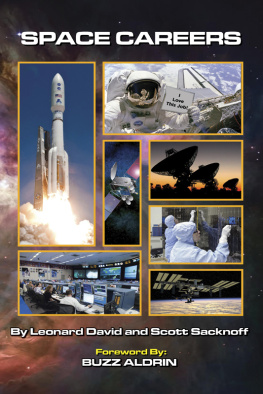
Often people attempt to live their lives backwards: they try to have more things, or more money, in order to do more of what they want so that they will be happier. The way it actually works is the reverse. You must first be who you really are, then, do what you need to do, in order to have what you want.
Margaret Young
Change is the law of life. And those who look only to the past or present are certain to miss the future.
John F. Kennedy
hroughout most of history, an individual learned a skill, craft, or profession and stuck with it throughout his or her entire life. If you became a blacksmith or a scribe, a lawyer or an engineer, you typically worked at the same company or operated the same business until you retired. For most of the twentieth century, that meant collecting your gold watch and pension at age 65.
But that was then and this is now. A tangle of factorsincluding changing attitudes about employment and retirement, the widespread use of computers and communications technology, and a drastically different economyhave fundamentally altered the playing field. In fact, these days, working at the same job or career throughout ones life isnt only pass; its undesirable.
The truth is, we all need to grow and reinvent ourselves periodically. Even those who remain in the same professionmedicine, design, teaching, law, marketing, banking, whateversometimes require a change of scenery or new challenges and opportunities. An information-centric world and an ongoing need to acquire knowledge mean that its sometimes necessary to gain broader exposure within a field or profession. Oftentimes, its possible to benefit by changing positions or jobs periodically.
The numbers dont lie. A half-century ago the average person worked in one to three jobs over his or her lifetime. Today, the typical individual swaps jobs approximately a dozen times during his or her working years. Moreover, it isnt the least bit unusual to hold two to four different careers over ones lifespan. Engineers become teachers, teachers become nurses, nurses become entrepreneurs, and entrepreneurs become writers and artists.
Achieving happiness while maintaining a successful, financially rewarding career is an attainable prospect. In fact, as age and gender barriers disintegrate, many people are reinventing themselves and embracing the concept of recareering.
However, its a journey that requires a good deal of thinking and serious planning. Swapping one career for another will almost certainly lead to stress and disruption. It will impact your family and friends, and it will alter your lifeincluding your social circlein ways you might not anticipate. As a result, its vital to think through the entire process and understand the positives and negatives before heading back to school or firing off a rsum.
Without adequate introspection and self-examination, you could find yourself in a new job or career but no more content than before. Finding a new job or embracing a new career isnt something that should take place on a whim. With careful thought and planning, not only the career change itself but also the steps that lead you there will result in a heightened quality of lifeif you embrace them with boldness, passion, and commitment.
The Six Biggest Myths for Career Changers
I should already know what type of work I want to do. Sure, there are those rare people who seem to know exactly what they want. However, for the rest of us, choosing a career is typically a long and involved process. You have to learn about yourself, including your preferences and personality traits, and you have to know all about different occupations before you commit to a change. It takes time and effort.
Career counseling will provide all the answers. Visiting a career counselor could be one of the smartest moves youll ever make. But dont expect her to wave a magic wand and imbue you with instant knowledge about what career and job are right for you. A good counselor guides you to the right decision by asking lots of questionsthe right questionsand leading you through personality assessments while providing the right tools and resources.
I can turn a hobby or passion into a viable business. Youve probably heard the expression, Be careful what you wish for. Well, when it comes to a career change, the warning is particularly valid. Yes, you might be able to parlay a hobby such as sports card collecting or sewing into a business. Plenty of people have succeeded. But you might also find that by transforming the hobby into work it ceases to be fun. More importantly, not all hobbies are suited to a business and even if they are, you might lack certain values and skills required to succeed. For instance, you might enjoy knitting but find it challenging to deal with customers.
The latest hot careers list will guide me to something thats right for me. Its tempting to look at magazine articles, websites, and other resources and select a career based on whats hot. However, keep in mind that just because a particular career is hot doesnt mean that its right for you. The right career must match your knowledge, skills, interests, and values. Moreover, any list thats forward-looking is based on predictions and subject to change.
If I change careers, all my past experience and skills will go to waste. Any knowledge or skill youve accumulated will likely pay dividends in the future. Life is all about breadth and depth of knowledge, and experience counts for a lot in todays ultracompetitive business world. Think of it this way: We are the sum of our work history and experiences.
Im too old to make a career change. You cant undo the past. So, think of the present as a blank slate. Do you want to wallow in the same career for the next 10 or 20 years and still find yourself fantasizing about a change? Martha Stewart didnt become a lifestyle guru until age 45, when she started Martha Stewart Living magazine. Novelist John Grisham worked as a lawyer and state legislator in Mississippi before publishing his first novel in 1989. Since then, he has sold more than 250 million books worldwide.
Is Starting Over Worth It?
Not surprisingly, the reasons for undergoing a career change are incredibly varied. For some, personal growth takes precedence. After years of laboring at the same job or in the same position, its simply time for something new or different. For others, the nature of the work may have changedparticularly after a series of promotions or reassignments.
For example, a salesperson that may have loved working with customers might find shuffling paperwork and directing employees completely draining and unsatisfying. An engineer who relished the daily challenges of figuring out design solutions and seeing them take shape might feel completely frustrated supervising projects from afar.
A lack of fulfillment and an inability to maximize ones talents cannot be underestimated. Barbara Moses, president of BBM Human Resources Consultants, Inc., has found that seven in ten managers and professionals report that they do not find their jobs satisfying. Many discover that their values and talents are mismatched with the type of work theyre doing. Others clash with their boss or arent particularly happy with their coworkers. The environment just doesnt seem right.
















